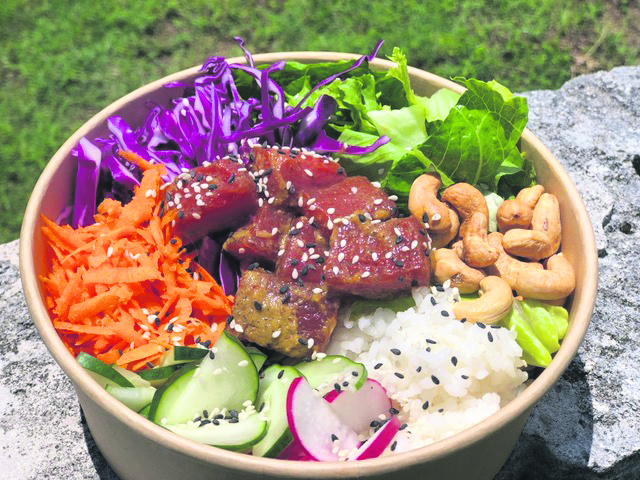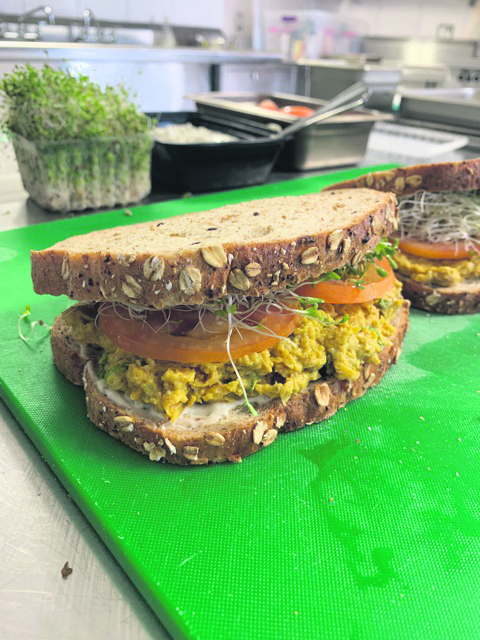At barbecues there’s chicken and hamburgers to navigate; at Christmas and Easter any menus with cassava pie, ham or turkey will likely be problematic.
Ultimately, it leads to a conversation filled with scepticism and disapproval.
Trevor Johnstone, the founder of Plant Based Fuel BDA, believes that “everything that we need comes from the earth” as plants have an abundance of vitamins, minerals and other vital nutrients.
“The animals don’t make calcium and iron. The plants do,” he said.
The “plant-based chef and nutrition advocate” is “passionate about motivating and encouraging people to eat healthier in order to live better”.

His concern is that misconceptions about vegan and vegetarian diets have led people to believe they don’t provide all the vitamins that are necessary for wellbeing.
Meat eaters argue that animal products are vital sources of nutrients not easily obtainable through a plant-based diet and that without careful planning, it’s tough to ensure adequate intake of nutrients like B12 and omega-3 fatty acids from plant foods.
According to Mr Johnstone, it’s not exactly true. Although B12 typically comes from animal products, changes in agricultural practices have caused meat eaters to take supplements to ensure they get their required dosage.
Another myth sometimes shared is that a plant-based diet will raise the cost of your grocery bill. That’s also not necessarily so, the entrepreneur said.
He believes that prioritising whole foods over processed vegan alternatives and consuming diverse fruits, vegetables, grains and seeds, and sea vegetables like kelp and sea moss, can help maintain a balanced diet and be economical and nutritious.
He has seen success especially, when people prepare meals at home; Mr Johnstone feels that health benefits such as chronic disease risk, increased vitality and sustained energy levels, make cooking yourself worth the extra effort.
“As long as you stick to whole foods and not processed vegan foods, the diet is not expensive,” he said.
Plant Based Fuel BDA provides “high quality and creative plant-based/vegan food”.

The idea is to make meals that taste good and are good for human health and the health of our planet. Mr Johnstone offers his services as a personal chef and caterer, gives cooking demonstrations and talks and provides weekly menus for people who can’t find the time to cook for themselves. Past selections include country fried mushrooms, poke salad bowls, chickpea sandwiches, black-eyed pea sliders and blueberry cheesecake.
“We truly believe that plant-based nutrition is the way of the future and that doctors in the future will no longer prevent/cure disease with medicine but with nutrition. Once people get educated on what, how and when to eat we believe that the chronic diseases that are destroying our species will no longer exist,” his website states.
“We want to raise the bar and break stereotypes while opening people’s minds [to] the power of plant-based vegan.”
While not everyone may choose to adopt a vegan or vegetarian lifestyle, by steering clear of processed foods and ensuring at least one day a week is meat-free, it is possible to improve overall health and wellness.
To bring out the best in food, people should consume foods at the same time of year that they are grown. Doing so adds flavour and nutritional content and minimises the environmental impact of long-distance transportation and the use of artificial means to extend shelf life, he said.
Expanding our taste buds to include a wider variety of fruits, vegetables, legumes and whole grains not only adds diversity to our meals but also ensures a richer intake of essential nutrients. Vitamins, minerals, fibre and antioxidants are vital for maintaining optimal health and reducing the risk of chronic diseases.
Additionally, by reducing our reliance on meat, we can contribute to environmental sustainability. Animal agriculture is a significant contributor to greenhouse gas emissions, deforestation and water pollution. Therefore, by consuming less meat, we can lessen our ecological footprint and promote a more sustainable food system for future generations, Mr Johnstone added.
Moreover, adopting a “no meat Monday” or similar approach encourages mindfulness about our food choices and fosters a greater appreciation for plant-based cuisine. It can also serve as an opportunity to explore new recipes, flavours and cooking techniques, making the transition to a more plant-centric diet both enjoyable and sustainable in the long run.
Through his work with Plant Based Fuel BDA, Mr Johnstone emphasises the abundance of nutrients in plant foods, the affordability of whole food options, the benefits of eating locally-sourced food in season and the importance of long-term health. Taken together, the knowledge helps individuals to make informed dietary choices that prioritise both personal and community wellness.
Ultimately, while the decision to follow a vegan or vegetarian diet entirely may not be for everyone, making small changes to reduce meat consumption and increase the intake of plant-based foods can have profound benefits for the environment and our overall wellbeing. As we navigate the misconceptions surrounding plant-based diets, we pave the way for a healthier, more sustainable future, individually and collectively.
For more on Plant Based Fuel BDA visit plantbasedfuelbda.com

